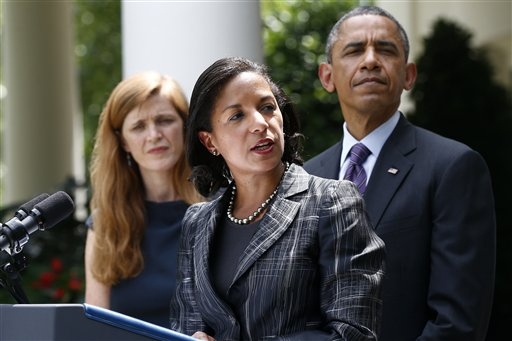
UNITED NATIONS (AP) — Libya brought Susan Rice her biggest success and, ultimately, caused her greatest professional disappointment.
Rice, who was appointed national security adviser Wednesday by President Barack Obama, has been a bold and blunt U.S. ambassador at the United Nations, successfully pushing for tougher sanctions against Iran and North Korea and for international intervention in Libya.
But her accomplishments were overshadowed by her role in the administration's bungled account of the terrorist attack in Libya that killed four Americans, including the U.S. ambassador.
Rice became the face of the Benghazi controversy when, relying on talking points from the administration, she said during several television appearances that the attacks were spontaneous. The assessment turned out to be incorrect and Republicans accused her of being part of a cover-up.
The furor scuttled Rice's long-held hopes of becoming secretary of state when it became clear she would not gain Senate confirmation to that post, which went to John Kerry.
Yet, Rice played a key role in pushing through a U.N. Security Council resolution in March 2011 authorizing "all necessary measures" to protect Libyan civilians who rose up and eventually toppled dictator Moammar Gadhafi.. She also marshaled her negotiating skills in getting Russia and China to agree to tougher sanctions against Iran and North Korea over their nuclear programs.
Obama stood by his longtime confidante, and announced that Rice will replace Tom Donilon as his national security adviser, a position that does not require Senate confirmation.
Rice, 48, is expected to bring her outspoken and aggressive negotiating style to her new, higher-profile job, which she will start in July.
She takes over at a time when Russia and the United States are struggling to find a political way out of Syria's civil war — one of the most intractable foreign policy challenges facing the Obama administration. As the top U.S. diplomat at the United Nations, Rice has been at the center of international sparring over Syria.
But it's unclear whether Rice's appointment to the post signals a significant shift in Obama's foreign policy, particularly in Syria. Although Rice backed greater U.S. involvement in Libya, administration officials have made clear they don't draw direct comparisons between the situation in Syria and the push to oust Gadhafi.
During her 4 1/2 years as the top U.N. ambassador, Rice gained a reputation for being blunt and sidestepping the niceties and courtesies that are a hallmark of diplomatic discourse when she deemed it necessary to make a point.
She has sparred repeatedly with Russia's U.N. Ambassador Vitaly Churkin, who can be equally blunt.
When Rice withdrew her name for secretary of state, Churkin jokingly requested "double pay" if she remained at the United Nations, calling her "one tough individual."
At home, the Republican response to her appointment was subdued. Sen. John McCain, a fierce critic of Rice, wrote on Twitter that he disagreed with her appointment but would "make every effort" to work with her on important matters.
By contrast, New York Democratic Rep. Eliot Engel, the ranking member of the House Foreign Affairs Committee, praised Rice's "exemplary job" representing U.S. interests at the U.N.
"I can imagine few people better qualified ... to head up the president's national security team," he said.
In private, Rice is known for her good sense of humor, which she has displayed at the U.N. Correspondents Association's annual awards galas.
At last year's ball she joked: "People have called me brusque, aggressive, abrasive. Of course, they don't say that to my face, because they know I'd kick their butts."
A graduate of Stanford University, Rice was a Rhodes Scholar at Oxford and served in the Clinton administration in various capacities from 1993-97, rising to assistant secretary of state for African affairs.
Like many other foreign policy experts of her generation, Rice was shaped by the United States' failure to prevent the 1994 Rwanda genocide.
Years later, she told a journalist, "I swore to myself if I ever faced such a crisis again, I would come down on the side of dramatic action, going down in flames if that was required."
Rice took a leave of absence from the Brookings Institution to become a senior foreign policy adviser to then-Senator Barack Obama in his 2008 presidential campaign and has never looked back. After his historic victory, Obama chose her for the U.N. ambassadorial post, where she has served since January 2009.
As a member of Obama's Cabinet as well as U.S. ambassador, Rice has spent more than four years shuttling between New York and Washington, where her husband and two children live.
She is well-liked by many U.N. diplomats who were rooting for her to get the secretary of state job, but some have grumbled that Rice's commuting life often kept her from the halls of the United Nations and the nightly round of receptions and dinners where most diplomacy is conducted.
Pakistan's U.N. Ambassador Masood Khan, a Security Council member whose country opposes U.S. drone strikes and is certain to be a priority for Rice in her new job, called her appointment "a great choice."
"This is good for the United States," he said. "She will be an effective leader, no doubt about it ... She had a larger than life presence here, so of course, we will miss her."
U.N. Secretary-General Ban Ki-moon called Rice "a strong voice in the Security Council and an effective advocate" on many U.N. issues, singling out her commitment to Africa and women's empowerment. Ban said he benefited from "her support and counsel," U.N. spokesman Martin Nesirky said.
Germany's U.N. Ambassador Peter Wittig tweeted: "Ambassador Rice embodied best of US(at)UN: her strong commitment and courage put multilateralism to work. We'll miss her enthusiasm...and her sense of humor."
"It's very sad to lose her because she was an excellent colleague," said France's U.N. Ambassador Gerard Araud. "She's fun, she's active, and she's a very good friend of mine."